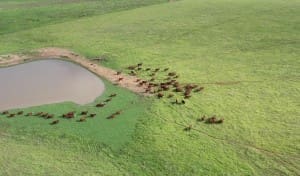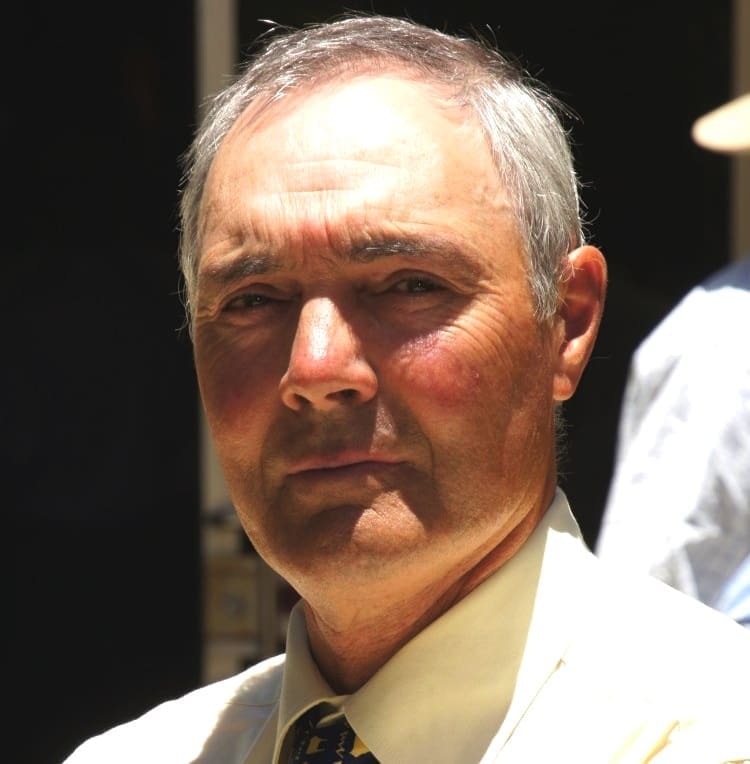WHILE the Global Roundtable for Sustainable Beef last week passed a resolution among its membership endorsing its global principles and criteria for defining sustainable beef and sustainable beef production practices, the motion was not supported by Cattle Council of Australia.
 Cattle Council told Beef Central yesterday that it had rejected the GRSB’s draft document outlining criteria defining sustainable beef practices in its current form.
Cattle Council told Beef Central yesterday that it had rejected the GRSB’s draft document outlining criteria defining sustainable beef practices in its current form.
Its opposition focussed on definitions associated with native vegetation clearing and livestock nutritional requirements, that it argued did not adequately reflect cattle production systems in Australia.
In this earlier article, the GRSB last week said each of its five constituent membership groups (producers, retailers, processors, commerce and civil constituency) had ‘overwhelmingly’ supported its draft global principles and criteria for sustainable beef production.
Beef Central understands that while four of the national beef producer bodies represented on the GRSB’s ‘production sector’ roll – the Canadian Cattlemens Association, the US National Cattlemens Association, Beef +Lamb NZ and Earth Alliance Brazil – voted in favour of the draft document, Australia’s CCA was opposed.
Among CCA’s key concerns was that the prescriptive detail expressed in many of the criteria could not adequately account for Australia’s production systems.
In particular it felt that the prescribed management of native vegetation and the nutritional requirements for cattle were too “US or European-focused” to transfer adequately into Australian circumstances. Click here to read GRSB’s relevant criteria descriptors.
CCA a month ago submitted suggested refinements to the draft definitions that it felt would better reflect Australian conditions in areas like land clearing, but the GRSB refused to modify its existing draft.
“CCA has always said, from the start of the Global Roundtable process, that if it was not comfortable with any of the principles and criteria, it would not support them,” CCA president Andrew Ogilvie said yesterday.
In general terms, CCA had problems with GRSB’s principle on land clearing, which was ‘quite specific’ about not ‘interfering’ with native vegetation.
“So much of Australia’s northern production systems, and to some extent in southern areas as well, rely on managing native vegetation regrowth in grasslands, and we felt the GRSB’s definition as it stood was going to conflict with the industry’s ability to do that,” Mr Ogilvie said.
Similar regrowth management systems are used in parts of the US beef industry, such as across Texas, the nation’s largest beef producing state, but the US NCBA did not raise the issue as a concern, voting in favour of the proposed principles and guidelines last week.
The second point of concern raised by CCA surrounded the principles’ references to animal nutrition.
“Australia frequently suffers some pretty bad droughts, and occasionally producers just do not have the ability to manage an animal’s nutrition as well as they would like. That needs to be understood, but it was not reflected in the terms used in the GRSB’s draft principles and criteria,” Mr Ogilvie said.
CCA did not attend last week’s meeting in Brazil, voting in absentia. It claimed the reason was a schedule clash with commitments in China over the critical Free Trade Agreement talks, and matters surrounding industry restructure talks and industry body annual general meetings this week at home in Australia.
“Our non-attendance in Brazil was not a form of protest – it was simply that CCA had other important commitments at the time,” Mr Ogilvie said.
Having already made its decision on the global principles and criteria, there was also a cost-saving element.
“We couldn’t see the point of spending a lot of producer money in going there to say ‘no’, when we had already made our mind up,” he said.
CCA stays engaged with GRSB process
While it voted against the global principles and criteria for defining sustainable beef at last week’s meeting, CCA said it remained committed to the GRSB organisation and its aims.
“Increasingly, stakeholders in the Australian beef industry are calling for more evidence that the industry is working to improve its sustainability credentials,” Mr Ogilvie said.
“The Australian beef industry is continuously evolving and adopting proactive and transparent approaches to meet customer and community expectations. As part of this process, the industry needs a clearer understanding of what data is currently available to determine what indicators are relevant.”
“The GRSB’s membership represents many of our industry’s major customers. It is committed to tackling the task of defining a global definition of a sustainable beef industry, and fostering continual improvement. These are both ideals that CCA supports,” he said.
“However on considering the GRSB draft principals and criteria, it was determined that CCA could not endorse the document in the current form, and we voted against their adoption.”
Mr Ogilvie said CCA would now work further to support a definition of sustainability that “genuinely reflected the realities of the Australian industry and environment.”
“CCA, through its membership of the Red Meat Advisory Council, is committed to ensuring the Australian industry can be recognised as world leaders to our customers. Industry has progressed the initial steps to develop an Australian Sustainability Framework that can deliver benefit to industry and transparency to our stakeholders,” he said.
The project entails an initial, high-level gap analysis of data and a series or possible indicators have been developed. Draft themes reviewed as part of the process included ‘Economic Prosperity’, ‘Environmental Management’, ‘Welfare of Livestock’ and ‘Nutrition and Food Safety’.
“In due course, we will put together a sustainability framework which suits and reflects the Australian beef industry,” Mr Ogilvie said.
“It might, or might not, match the GRSB’s principles and criteria,” he said.




It maybe be finally dawning on the CCA that they have walked into a trap.The CCA joined up with the WWF,JBS,McDonalds and others in 2011 despite the vocal opposition of cattle producers who knew exactly where this scam would end up.The CCA speculated that Australia’s “industry programs”,laws,regulations,AQIS inspections,AUSMEAT audits etc,etc, made getting a “sustainable”accreditation virtually automatic.Now reality is starting to bite hard.It seems our draconian native vegetation laws are not draconian enough for the WWF.In fact it is now emerging in sugar coated mealy mouthed terms that cattle producers will have to satisfy 45 tests (i.e.5 principals x 9 guidelines).This will include annual proof that cattle producers have reduced GHG emissions as the WWF is religiously committed to global warming and the erroneous belief that CO2 is a “pollutant”In practice the only way cattle producers can satisfy this test is by continually reducing stocking rates.If this sounds like a recipe for going out of business,it is.
How much longer is the CCA going to persist in selling out cattle producers and Australia’s sovereign right to make our own laws.
The CCA is to be highly congratulated in its stance on this issue. The Australian industry must be responsible for setting its own sustainability standards – not WWF. Former Senator Ron Boswell wrote an excellent article on this early in 2013 as a warning to all – see to his website ronboswell.com.
WWF have a very clever campaign of convincing large consumer retailers, such as McDonalds in the beef industry and Coca Cola in the sugar industry, to participate and fund these programs (in the sugar industry the program is called Bonsucro). WWF then set themselves up as the ‘accrediting body’ – and start a steady process of ratcheting up the standards, making it harder and more expensive for the respective industry to meet their sustainability standards.
The CCA’s move to develop an Australian Sustainability Framework is spot on – the Australian industry should and must take back control of this issue – or forever be the puppet of WWF.
Are CCA now opening their eyes to this farce? There can be no positives in getting into bed with the likes of WWF, the greens etc – just look at our native timber industry. These groups do not support what we do – does it say anywhere in the draft that they do? and when was last WWF “eat more red meat” campaign? The timber industry in Tasmania thought there was nothing to lose from talking with these groups ( they forgot how powerful they are, and that the greens pull labours strings ) now we import rainforest, ours is locked up, and the timber workers are on the dole! One thing it hopefully has done, is to open our eyes to their tactics, and give us a push to promote ourselves better, and get organised to fight these nutters. Now that we grassfed producers look like keeping some of our money away from the shiny arses, promoting what WE do should get easier. We are as sustainable, and low impact as any protein producers, but consumers don’t know this. Maybe we need some certifiable standards to help promote what we do, but NOT involving any of these white ants. I’ll say it again, there is NOTHING to be gained from legitimizing these nutjob idealist groups.
Jason Hall
Some people seem to learn very slowly. Tell me the last time WWF did anything to earn trust. If you lay down with pig, you will smell like pig.
Congratulations Andrew. In 1996, when I started a concept called Australian Prime Pastured, I was highly critical of CCA lack of support for its constituency, the grass finishers. Now I think you have it right not to follow the US down their pathway. This is a country that has all but destroyed one of the greatest grasslands in the world, The Great Prairie, with intensive cropping. Very late in the piece for US farmers has come the appreciation that grasslands need grazers for sustainability and now they are trying to save what’s left against the power of the grain lobby who want to say it is all or nothing. Australia is not NZ or US or even Brazil with the benefits of ice thaw keeping rivers and water resources alive. We are the driest inhabited country on Earth and we need to respect that and help our landscapes and our stock when we can. It is fundamental to the nature of grazing animals to wander in search of food. Ruminants are incredible fuel-to-energy converters in natural systems, that is their design and place in the whole scheme of things. Sometimes just a bit of added help in times like these keeps these animals free, fed and the whole system in place. Don’t listen to the US or Brazil (who have sold the fabulous Pampa to soybeans) or even NZ who don’t understand drought